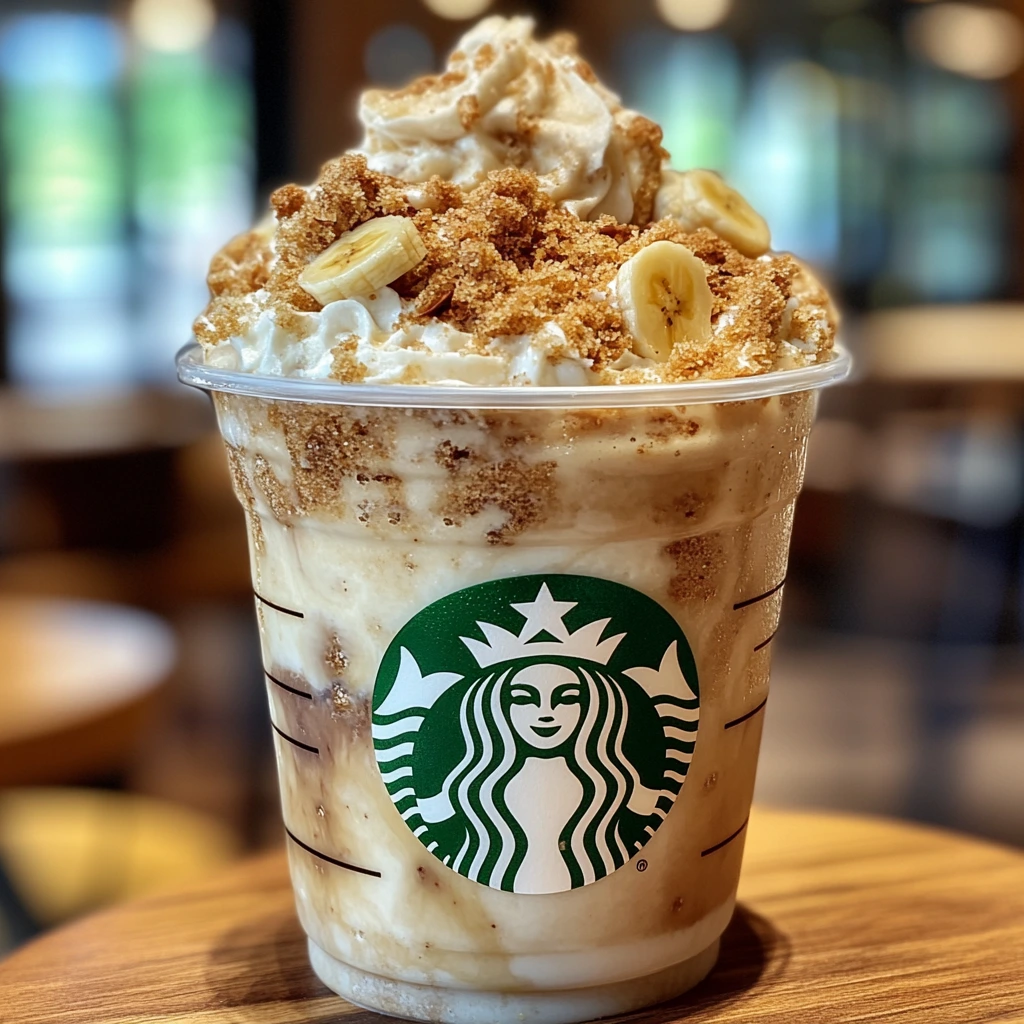Starbucks banana loaf is a beloved treat for many coffee shop visitors. It offers a sweet, comforting option alongside their favorite beverages. Whether you’re stopping in for your daily coffee or craving a snack, this loaf is often hard to resist. But if you have dietary restrictions or are simply curious about what goes into your food, you might wonder: Does Starbucks banana loaf contain eggs? In this blog post, we’ll take a closer look at the ingredients in Starbucks’ banana loaf. We’ll also explore its nutritional value, potential allergens, and whether it fits into different dietary preferences. Let’s dive into what makes this loaf so irresistible — and whether it’s suitable for everyone
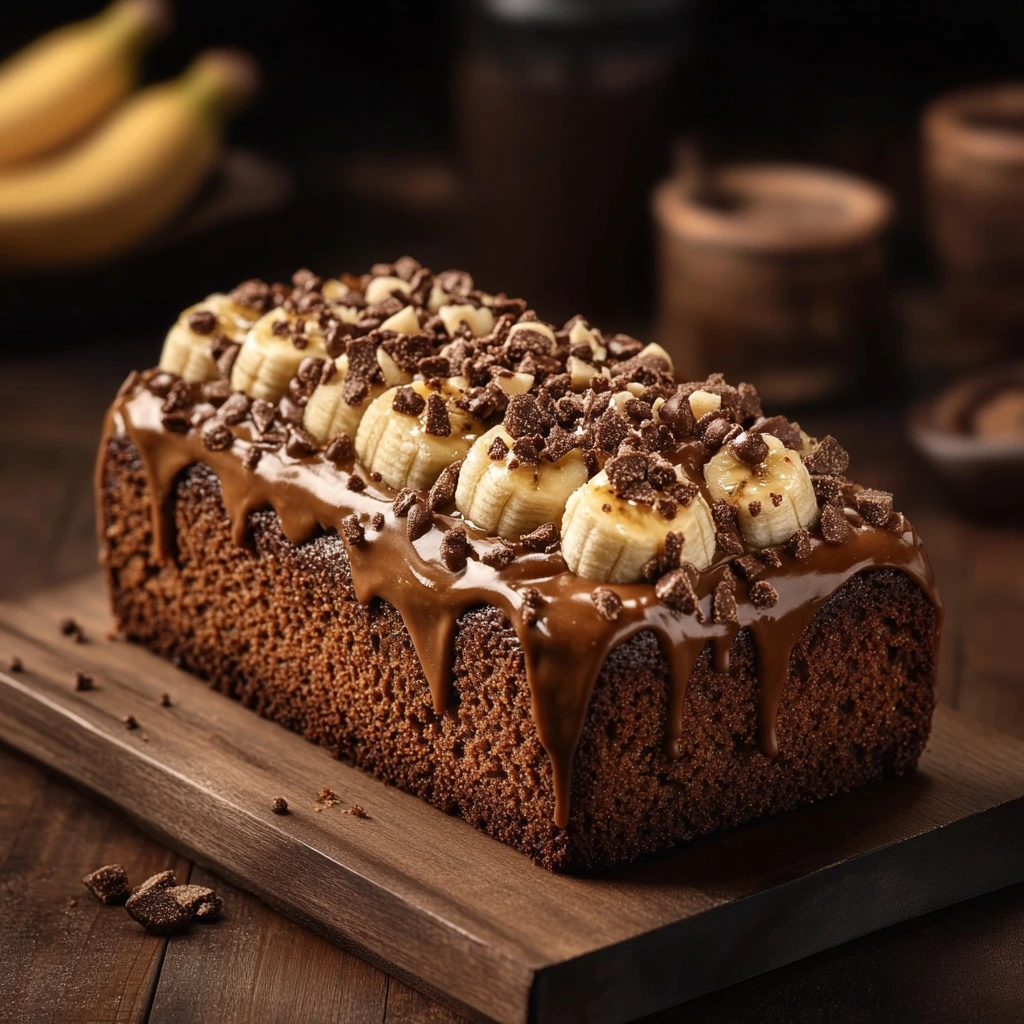
Understanding the Ingredients of Starbucks Banana Loaf
Starbucks banana loaf is a popular treat, celebrated for its moist texture and rich banana flavor. To truly appreciate what makes this loaf so tasty, we need to look at its key ingredients. In this section, we’ll break down the main components of Starbucks banana loaf. We’ll also discuss whether eggs are included and how these ingredients improve the loaf’s taste and texture.
Overview of Starbucks Banana Loaf Recipe
At the core of Starbucks banana loaf is the humble banana, which provides both natural sweetness and moisture.The recipe highlights the banana’s natural flavor. It combines flour, sugar, and fat to create a soft, tender crumb. Starbucks uses common ingredients found in most banana bread recipes. These include butter, baking soda, and a hint of vanilla extract to enhance the flavor. The loaf is baked to perfection, with a golden-brown top. Its dense, moist interior has the perfect balance of sweetness and banana flavor.for more details clic here.
Does Starbucks Use Eggs in Their Banana Loaf?
A key question for many consumers is whether Starbucks banana loaf contains eggs. The answer depends on the specific recipe used at your local Starbucks, as ingredients can vary slightly by region or supplier. Traditionally, eggs are a common ingredient in banana bread recipes, contributing to the structure, texture, and moisture of the loaf. In some cases, Starbucks may use egg substitutes or alternative binding agents instead of eggs. They often do this to accommodate dietary preferences or concerns
Check the product’s ingredient list at your Starbucks to find out if eggs are included in the loaf. You can find it on their website or in-store. Some locations may offer egg-free or plant-based versions of the banana loaf to meet various dietary needs.
Other Ingredients in Starbucks Banana Loaf
Aside from bananas and eggs (if included), Starbucks banana loaf contains a variety of other key ingredients. Some of the most common include:
- Flour: Typically all-purpose flour, which provides the structure for the loaf.
- Sugar: A combination of white and/or brown sugar adds sweetness and moisture.
- Butter or Oil: These fats contribute to the loaf’s rich, soft texture. While butter is the most common fat used, some locations may opt for vegetable oil as a substitute.
- Baking Soda: This leavening agent helps the loaf rise, creating a fluffy interior.
- Vanilla Extract: This adds a subtle depth of flavor to the loaf.
- Salt: Enhances all the flavors and balances the sweetness of the loaf.
Some versions of the banana loaf may include extra ingredients like nuts or chocolate chips. These add texture and flavor. However, they are optional and may vary by region.
By understanding these key ingredients, you can decide if Starbucks banana loaf fits your dietary needs and preferences.
Does Starbucks Banana Loaf Contain Any Allergens?
When it comes to enjoying a treat like Starbucks banana loaf, it’s important to be aware of any potential allergens, especially for those with food sensitivities or dietary restrictions. Banana loaf, like many baked goods, can contain common allergens that may affect individuals with specific allergies. In this section, we’ll explore some of the most common allergens found in Starbucks banana loaf, how to identify them, and what alternatives may be available for those who need to avoid certain ingredients.
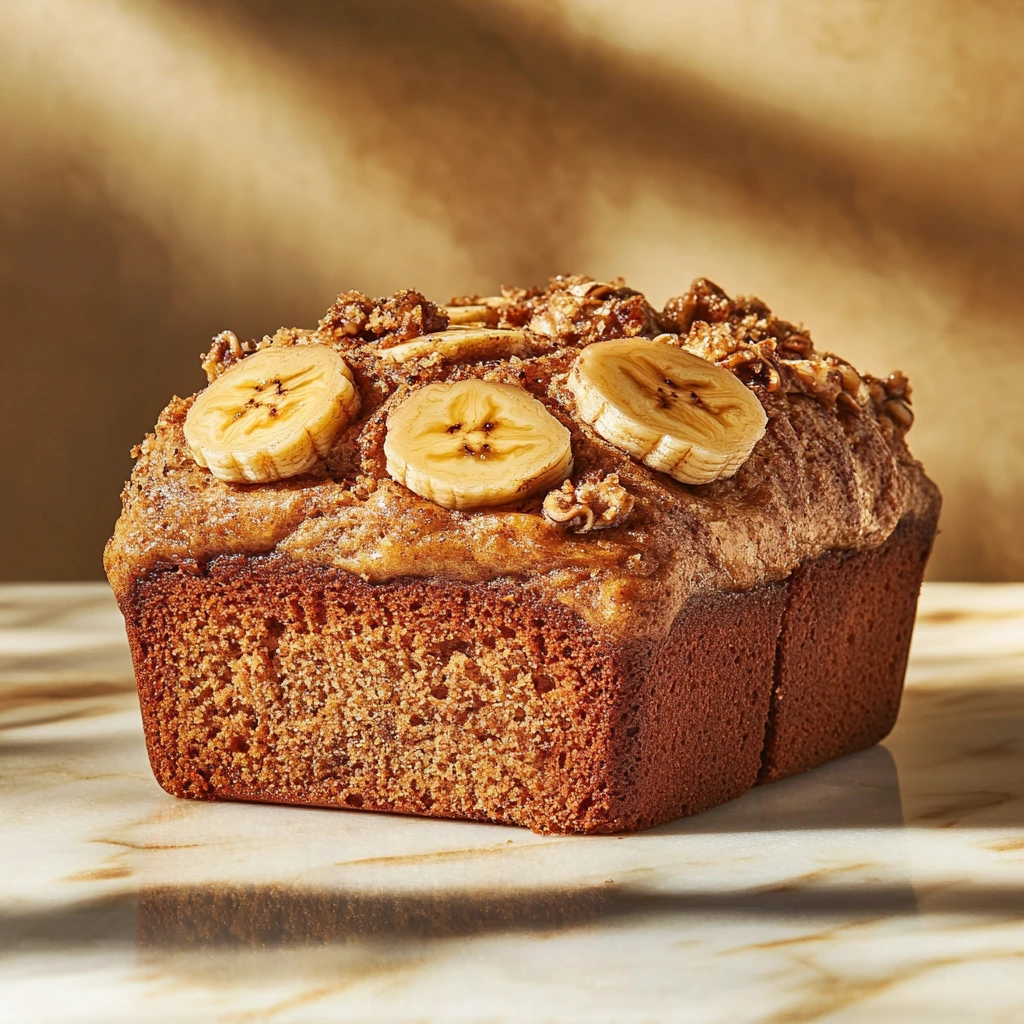
Common Allergens in Baked Goods
Baked goods, including banana loaf, often contain several ingredients that are recognized as common allergens. These ingredients can vary slightly depending on the recipe used, but some of the most frequent allergens in Starbucks banana loaf may include:
- Eggs: Eggs are a key ingredient in many banana bread recipes, contributing to the structure, moisture, and binding of the loaf. If the loaf does contain eggs, it may not be suitable for individuals with egg allergies or those following a vegan diet.
- Dairy (Butter or Milk): Dairy is often used in banana loaf recipes in the form of butter or milk. Dairy can be an issue for individuals with lactose intolerance, milk allergies, or those who follow a dairy-free or vegan diet.
- Gluten (Wheat Flour): Traditional banana loaf recipes typically include wheat flour, which contains gluten. This can be problematic for people with celiac disease or gluten sensitivity. Individuals avoiding gluten would need to find a suitable gluten-free option.
- Nuts: Although Starbucks banana loaf doesn’t always include nuts, some variations or regional recipes may contain them, such as walnuts or pecans. This could pose a risk for those with nut allergies.
- Soy: Some commercial recipes, particularly in larger food chains, may include soy-based ingredients or soy lecithin as an emulsifier in their baked goods. This could be an issue for people with soy allergies.
- Sugar: While not a typical allergen, individuals with sugar sensitivities or those following a low-sugar or diabetic diet may be concerned about the sugar content in banana loaf. The keyphrase “Starbucks banana loaf ingredients” can help identify the exact components of the treat.
Is Starbucks Banana Loaf Safe for Vegetarians?
For vegetarians, the main concerns when it comes to banana loaf typically involve the presence of eggs and dairy. Since traditional banana loaf recipes often contain both of these ingredients, the loaf may not be suitable for someone who avoids animal products. However, many Starbucks locations may offer plant-based options, which could include an egg-free and dairy-free version of their banana loaf. It’s important to check the ingredient list, as substitutions such as plant-based milk and egg replacers may be used in vegan-friendly versions.
Some vegetarians may also avoid banana loaf that contains gelatin or other animal-derived additives, so it’s always best to confirm whether these ingredients are included.
Starbucks Banana Loaf and Gluten-Free Diets
For those with gluten sensitivity or celiac disease, finding a gluten-free version of Starbucks banana loaf is crucial. Unfortunately, Starbucks’ standard banana loaf typically contains wheat flour, which means it is not gluten-free. While there are occasional gluten-free offerings at Starbucks, their banana loaf is generally not one of them.
However, Starbucks has made efforts to offer gluten-free alternatives in other baked goods, so it’s worth inquiring with your local store or checking their online menu to see if any gluten-free options are available. For those who need to avoid gluten but still crave banana loaf, making a homemade gluten-free version using alternative flours (like almond flour or rice flour) is always an option.
How to Avoid Common Allergens
If you’re concerned about allergens in Starbucks banana loaf, here are a few tips for avoiding them:
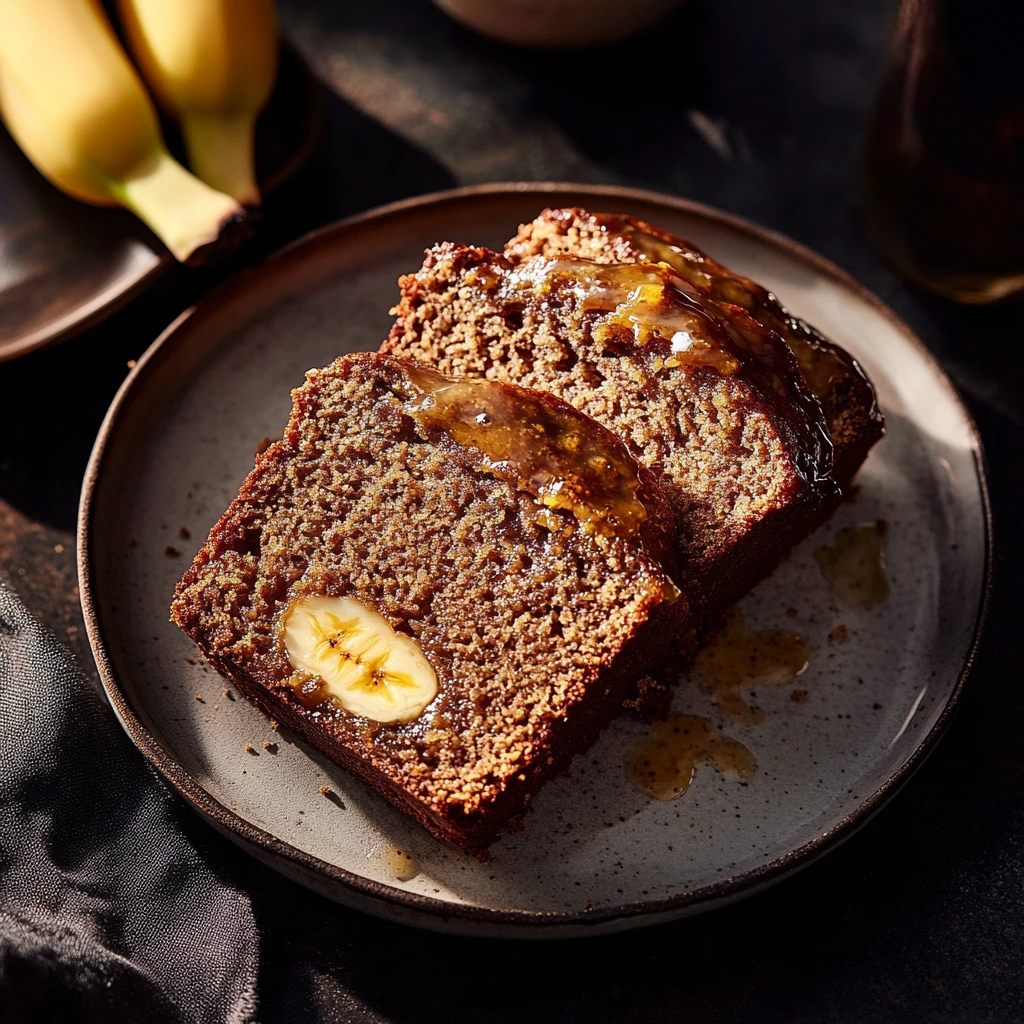
- Check the Ingredient List: Always check the ingredient list, which can typically be found on Starbucks’ website or on in-store signage.
- Ask for Ingredient Information: Don’t hesitate to ask the barista about specific allergens in the banana loaf before purchasing.
- Consider Substitutions: If you’re avoiding dairy, ask whether a dairy-free version of the banana loaf is available. Similarly, inquire if any egg-free options can be provided.
- Look for Vegan and Gluten-Free Options: If you’re following a vegan or gluten-free diet, explore Starbucks’ other offerings, as they may have suitable substitutions that meet your dietary needs.
Nutritional Information of Starbucks Banana Loaf
Starbucks banana loaf is a delicious and indulgent treat, but before you grab a slice, it’s important to consider its nutritional value. Whether you’re tracking your calories, monitoring your sugar intake, or just curious about what goes into your favorite loaf, understanding its nutritional profile can help you make an informed decision. In this section, we’ll take a closer look at the key nutritional information of Starbucks banana loaf, including calories, sugar, fats, and potential health benefits, so you can better understand how it fits into your diet.
Calories and Nutritional Breakdown
Starbucks banana loaf is known for its rich flavor and moist texture, but this also means it tends to be calorie-dense. On average, a single slice of Starbucks banana loaf contains around 350-400 calories, depending on the size and region. The loaf is a satisfying, energy-boosting option for those who enjoy a sweet snack or a light breakfast alongside their coffee.
In addition to calories, the nutritional breakdown typically includes the following:
- Total Fat: Around 15-20 grams of fat per slice, depending on the size. Much of the fat content comes from butter or oil used in the recipe, which contributes to the loaf’s rich texture. It’s important to note that some of this fat may be saturated fat, which should be consumed in moderation as part of a balanced diet.
- Saturated Fat: Each slice contains about 5-7 grams of saturated fat. This is important for individuals who are monitoring their intake of saturated fat, which is linked to higher cholesterol levels and heart health concerns when consumed in excess.
- Carbohydrates: A slice of banana loaf contains around 40-50 grams of carbohydrates, primarily coming from the flour and sugar. As a carbohydrate-rich snack, it provides quick energy, but it’s important to be mindful of the sugar content, especially for those monitoring their blood sugar levels.
- Fiber: You can expect around 2-3 grams of dietary fiber per slice, primarily from the bananas and any whole grain flour used. Fiber is beneficial for digestive health and can help keep you feeling full longer.
- Protein: Each slice of banana loaf contains about 3-5 grams of protein. While not a significant source of protein, it provides a small boost that complements the other macronutrients.
- Sugar: Starbucks banana loaf contains around 20-30 grams of sugar per slice, depending on the recipe and region. This is primarily from the added sugar and the natural sugars in the bananas. For those concerned about sugar intake, this can be an important factor to consider, particularly for individuals with diabetes or those trying to limit their sugar consumption.
Does Starbucks Banana Loaf Offer Any Health Benefits?
While Starbucks banana loaf is undeniably tasty, it’s not exactly a health food. However, it does provide a few benefits that may make it a more nutritious option compared to other sweets or snacks:
- Bananas: The star ingredient in the loaf, bananas are a good source of vitamins and minerals, including vitamin C, potassium, and B6. Potassium is especially beneficial for heart health and can help regulate blood pressure, while vitamin C supports immune function.
- Fiber: The fiber content in the banana loaf helps support healthy digestion and can contribute to better gut health. Fiber also helps regulate blood sugar levels and supports feelings of fullness, which can be beneficial if you’re trying to avoid overeating.
- Healthy Fats (in moderation): If the loaf contains healthy fats such as those from nuts or plant-based oils, it can offer beneficial omega-3 fatty acids that support brain and heart health. However, if the loaf contains mostly saturated fats from butter, these should be consumed in moderation.
Is Starbucks Banana Loaf Considered Healthy?
Here’s the rewritten version with shorter sentences:
While Starbucks banana loaf offers some nutritional benefits, it’s best to consider it as an occasional treat. The combination of sugar, refined flour, and fats gives quick energy. However, it may not be the best option for those looking for a nutrient-dense snack.
If you’re watching your calorie intake or have a sweet tooth, this loaf can be satisfying with your coffee. But if you focus on a balanced diet, consider smaller portions or enjoy it as a rare indulgence. If you’re concerned about sugar or fat, pair the loaf with a protein-rich beverage or snack to balance the meal.
For a healthier option, try making a homemade banana loaf. Use whole wheat flour, less sugar, and add nuts for protein and healthy fats.
Are There Any Plant-Based or Egg-Free Alternatives to Starbucks Banana Loaf?
As dietary preferences and restrictions become more common, many people are seeking plant-based or egg-free alternatives. This may be due to allergies, ethical beliefs, or health reasons. Consumers may wonder if Starbucks offers options for those needs. In this section, we’ll explore alternatives for anyone who wants to enjoy a banana loaf without eggs or animal products.
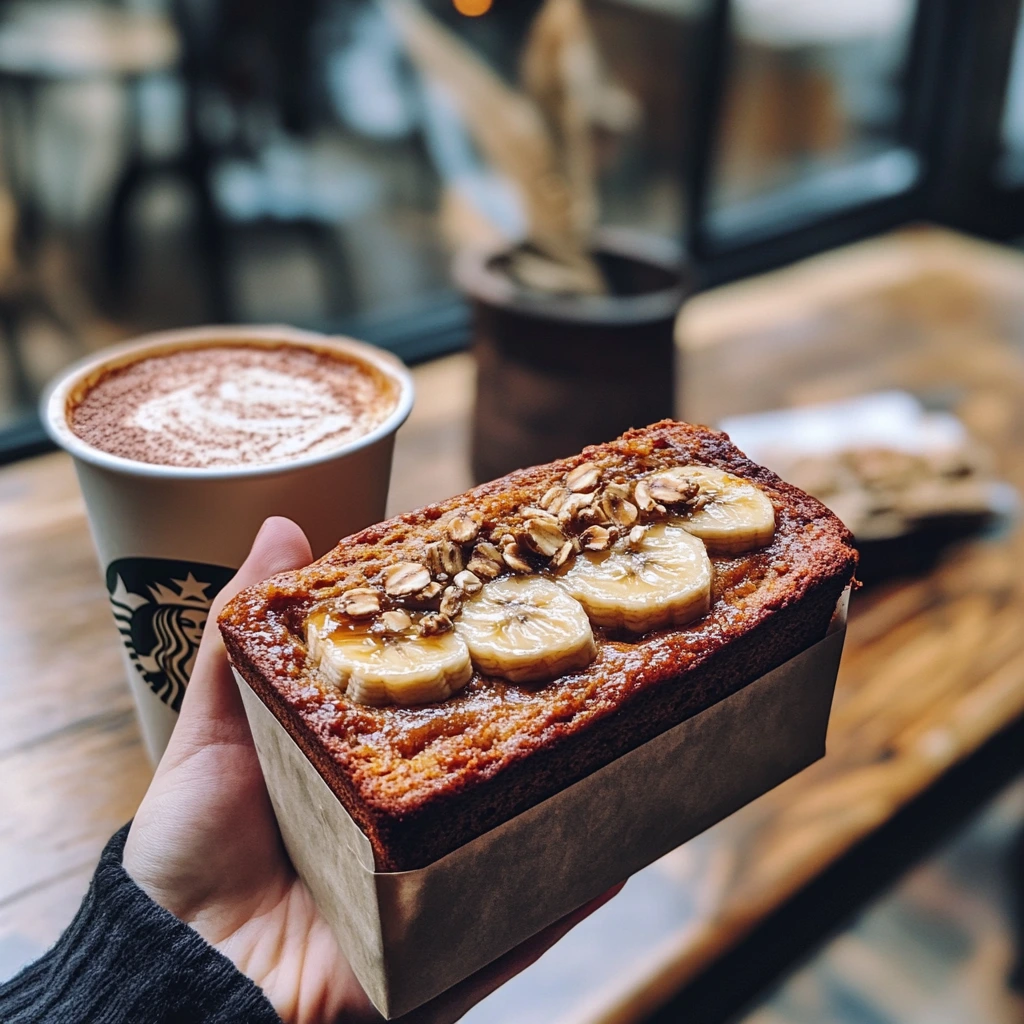
Vegan and Egg-Free Options at Starbucks
Starbucks has made strides in offering plant-based options for customers with dietary preferences. While the standard banana loaf contains eggs and dairy, some locations offer vegan or egg-free alternatives. These versions often use plant-based substitutes to replace eggs and dairy, such as:
Egg Replacers: Common substitutes like mashed bananas, flaxseed meal mixed with water (a “flax egg”), or commercial egg replacers are used to bind the ingredients and retain the loaf’s moist texture.
Dairy-Free Ingredients: Instead of butter or milk, plant-based versions use almond milk, soy milk, coconut oil, or plant-based butter. These ingredients ensure the loaf is egg-free and dairy-free, making it suitable for vegans and lactose-intolerant individuals.
However, not all Starbucks locations may offer these egg-free or vegan versions. Availability varies by region. It’s a good idea to ask your barista or check the menu for updated options. Some stores may offer vegan banana bread seasonally or as a rotating option.
Can You Make Egg-Free Banana Loaf at Home?
If Starbucks doesn’t offer an egg-free version, or you prefer making your loaf at home, it’s easy to create a delicious egg-free version. Banana loaf ingredients can be easily adapted to meet different dietary needs. Here’s how to make your own egg-free banana loaf:
Use a Plant-Based Egg Substitute: You can use flax eggs, chia eggs, or mashed bananas. For one egg, mix 1 tablespoon of flaxseed meal or chia seeds with 3 tablespoons of water. Let it sit to thicken. Adding an extra mashed banana will also help keep the loaf moist.
Opt for Non-Dairy Milk: Replace cow’s milk with almond, oat, or coconut milk. Each type of non-dairy milk brings its own flavor, so pick one that complements the banana flavor.
Vegan Butter or Oil: Swap regular butter for vegan butter or vegetable oil. Coconut oil works well and adds a subtle flavor that complements the bananas.
Add Extras for Texture and Flavor: You can include nuts, dried fruits, or dairy-free chocolate chips to enhance the texture and taste.
By making your own banana loaf, you control the ingredients and can tailor it to your dietary needs, whether you’re avoiding eggs, dairy, or gluten.
How Does the Taste of Egg-Free Banana Loaf Compare?
If you’re concerned about the taste and texture of an egg-free banana loaf, don’t worry. The right substitutes make the flavor and texture very similar to the traditional version. Here’s what to expect:
Texture: Without eggs, the loaf may be slightly denser. However, it will still be moist and soft thanks to the bananas and plant-based butter or oil. With the right egg replacers, the loaf should hold together well.
Flavor: The banana flavor will still be the star. Some egg replacers like flaxseed may add a subtle earthy flavor, but it won’t overpower the banana.
Sweetness: Egg-free banana loaf may be a bit less sweet. If you’re making it at home, feel free to adjust the sweetness with less sugar or natural sweeteners like maple syrup or agave.
Overall, egg-free banana loaf can be just as enjoyable as the traditional version. Many find the strong banana flavor makes up for any minor changes in texture or flavor.
What to Look for in Other Vegan and Egg-Free Baked Goods at Starbucks
If you’re not craving banana loaf but still want a plant-based or egg-free snack, Starbucks offers other vegan-friendly options. Consider these:
Vegan Muffins: Starbucks sometimes offers vegan muffins made without eggs or dairy. These often include fruits like blueberries or carrots for natural sweetness.
Vegan Cookies: Some locations offer vegan cookies made without eggs or dairy, perfect for a quick sweet treat.
Gluten-Free Options: For those avoiding gluten as well as eggs, Starbucks offers gluten-free baked goods. However, not all are vegan.
Be sure to check the ingredient list or ask your barista about plant-based or egg-free options.ur barista for vegan-friendly options if you’re uncertain about specific ingredients.
Should You Choose Starbucks Banana Loaf?
Starbucks banana loaf is a beloved treat for many coffee shop visitors. It offers a sweet, comforting option to enjoy with coffee or tea. However, like any food, it’s important to consider the pros and cons before deciding if it’s right for you. Whether you’re having it as a snack, breakfast, or dessert, this section will help you determine if Starbucks banana loaf aligns with your dietary preferences, health goals, and lifestyle.
Consider Your Dietary Needs and Health Goals
One of the most important factors in deciding whether to choose Starbucks banana loaf is understanding how it aligns with your dietary needs and health goals. While this loaf is undeniably delicious, it is also relatively high in calories, sugar, and fat. Here are some factors to consider:
- Calorie Conscious: If you’re watching your calorie intake, Starbucks banana loaf may be a heavier option. It has around 350-400 calories per slice. This calorie-dense treat can add up quickly if you’re not mindful of portion sizes. If you want a lighter snack, you might want to enjoy this loaf sparingly or choose something with fewer calories.
- Sugar and Fat Content: Each slice contains 20-30 grams of sugar and 15-20 grams of fat. The loaf is high in sugar and saturated fat. If you’re limiting sugar due to conditions like diabetes or following a heart-healthy diet, keep these factors in mind. For those on low-sugar or low-fat diets, this loaf may not be the best daily choice.
- Dietary Restrictions: If you follow a plant-based, egg-free, or gluten-free diet, consider whether this loaf meets your needs. While some Starbucks locations offer egg-free or plant-based versions, the standard loaf contains eggs and dairy. It’s also not gluten-free, so it’s not suitable for those with gluten sensitivity or celiac disease. Always check ingredient lists or ask about vegan and gluten-free options if these are important to you.
The Taste and Satisfaction Factor
If you’re someone who values flavor and satisfaction, Starbucks banana loaf is likely to hit the mark. Its rich, moist texture, balanced sweetness, and banana flavor make it an enjoyable treat that can be hard to resist. Many people find that a single slice is enough to satisfy their craving for something sweet and comforting, especially when paired with a hot coffee or tea.
The loaf’s appeal lies in its familiar, classic flavor that’s both nostalgic and comforting. Whether you’re enjoying it as a mid-morning snack or an afternoon pick-me-up, its soft texture and natural sweetness from ripe bananas make it a go-to choice for banana bread lovers.
If you’re someone who finds joy in savoring a flavorful treat without worrying too much about the nutritional breakdown, Starbucks banana loaf can be an indulgence worth having occasionally.
Is It Worth the Price?
When considering whether to choose Starbucks banana loaf, the price is another factor to keep in mind. Starbucks banana loaf slices typically range in price from $2.50 to $3.50, depending on the location and region. While this price may seem reasonable for a baked treat, it is typically more expensive than what you might find at a local bakery or when making the loaf at home.
However, many people are willing to pay the premium for the convenience of grabbing a slice with their coffee during a busy day. The convenience of Starbucks being easily accessible, especially in urban areas or while running errands, may outweigh the extra cost for some customers. Additionally, the premium price may be justified by the quality of ingredients and the consistency of the product at Starbucks locations.
If you’re more price-sensitive and enjoy baking, making your own banana loaf at home can be a cost-effective alternative. Making homemade banana bread allows you to prepare it in bulk, often at a lower cost, while customizing it to fit your taste preferences and dietary needs
Environmental Considerations
For those who are environmentally conscious, it’s worth considering the sustainability of your food choices. Starbucks has made commitments to sustainability, including sourcing ingredients responsibly and reducing its environmental footprint. However, like many large chains, the packaging and sourcing practices of pre-packaged baked goods may not always align with the most eco-friendly practices.
If sustainability is a top priority for you, you might choose to support local, independent bakeries or consider baking your own banana loaf at home. This gives you greater control over ingredient sourcing, waste reduction, and the environmental impact of your food choices.
Occasional Indulgence or Daily Staple?
Ultimately, whether Starbucks banana loaf is a good choice depends on how often you enjoy it. As an occasional treat, it can be a satisfying snack with your coffee or tea. However, due to its high sugar and calorie content, it’s best eaten in moderation. This is especially true if you’re focused on health or weight goals.
If you’re craving a quick, satisfying snack, Starbucks banana loaf is a great option. But if you’re focused on long-term health or need a more nutritious snack, consider alternatives or limit how often you indulge
Chef’s Note:
As a chef, I believe food should be an experience—something that brings joy, comfort, and a sense of indulgence. Starbucks banana loaf, with its rich texture and sweet, banana-filled flavor, certainly ticks all those boxes. It’s a treat that can brighten up any coffee break or serve as a comforting snack during a busy day. However, as with any indulgent dish, it’s essential to enjoy it in balance. Consider your dietary needs, health goals, and personal preferences when deciding whether this banana loaf is the right choice for you.
For those seeking a plant-based or egg-free option, it’s worth exploring alternatives, either from Starbucks or in your own kitchen. Whether you’re making it at home with healthier swaps or finding a vegan version at your local Starbucks, the joy of a perfectly baked banana loaf can be enjoyed by everyone, no matter their dietary restrictions.
Ultimately, remember that food is meant to nourish and delight. So, when you choose to savor that slice of Starbucks banana loaf, let it be a moment of pleasure, enjoyed in moderation, and always paired with a mindful approach to your overall health.
Happy baking, and happy eating!

